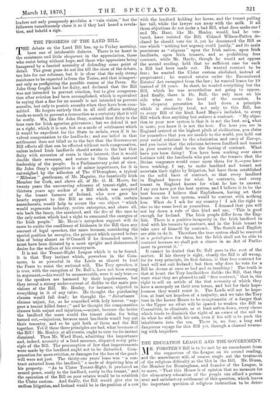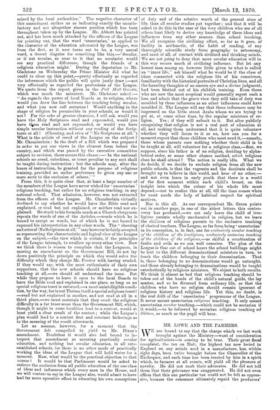mined by the local authorities." The negative character of this
amendment strikes us as indicating exactly the unsatis- factory and not altogether sincere position which has been throughout taken up by the League. Mr. Abbott has pointed out, and has been much attacked by the officers of the League for pointing out, that the word 'unsectarian,' as applied to the character of the education advocated by the League, was from the first, as it now turns out to be, a very unreal word, a decent disguise for something like this,—' Secular, or if not secular, so near to it that no secularist would see any practical difference, though the friends of a religious education might.' Daring the deputation to Mr. Gladstone on Wednesday the Prime Minister did what he could to clear up this point,—pretty effectually as regarded the inferences which the public will quite justly draw ;—not very effectually as regarded the professions of the League. We quote from the report given in the Pall Mall Gazette, which was much the minutest. Mr. Gladstone asked :— " As regards the power of local Boards as to religion, where would you draw the line between the teaching being secular, and what you now call sectarian ? Would anything in the shape of religion be permissible in your schools, or would it not ? For the sake of greater clearness, I will ask, would you have the Holy Scriptures read and expounded, would you have t}iem read and not expounded, or would you have simple secular instruction without any reading of the Scrip- tures at all ? (Cheering, and cries of "No Scriptures at all.") What is the article of creed of the League on the subject ? Mr. Chamberlain : In the draft of a Bill which was prepared in order to put our views in the clearest form before the country, and which was passed by the executive committee subject to revision, there occurs this clause In the national schools no creed, catechism, or tenet peculiar to any sect shall be taught during instruction ; but the schools may, after the hours of instruction, be granted for the purpose of religious training, provided no undue preference be given any one or more sects to the exclusion of others.' "
From this, it is quite clear that, at least a large number of the members of the League have never wished for unsectarian ' religious teaching, but rather for no religious teaching, in any national school. That admission, however, was not extracted from the officers of the League. Mr. Chamberlain virtually declined to say whether he would have the Bible read and explained, or read but not explained, or neither read nor ex- plained. He stuck to his formula much as a Church clergyman repeats the words of one of the Articles, words which he is bound to accept as words, but of which he is not bound to expound his interpretation in any other words. The " cheering anderies of 'No Scriptures at all,' " may however be fairly accepted as representing the characteristic and logical view of the League on the subject,—the view which is certain, if the principles of the League triumph, to swallow up every other view. Now we think there is reason to complain that the Leaguers, in moving an amendment on the Government Bill, do not lay down positively the principle on which they would solve the difficulty which they charge Mr. Forster with having evaded. If they would say, with the most enthusiastic of their own supporters, that the new schools should have no religious teaching at all,—we should all understand the issue. But while they propose to leave it open to the local Boards to have the Bible read and explained in one place, so long as no special religious tenet is enforced,—a most unintelligible condi- tion, by the way, for is not Theism itself a special religious tenet? —read but not explained in another, and not read at all in a third place,—we must maintain that they evade the religious difficulty in a far truer sense than the Government Bill, which, though it might in some localities lead to a contest, would at least yield a clear result of the contest ; while the League's plan would lead to a contest first and constant bickerings as to the meaning of the result afterwards.
Let us assume, however, for a moment that the Government felt compelled to yield to Mr. Dixon's amendment. Doubtless it would also feel bound to in- terpret that amendment as meaning practically secular education, and nothing but secular education, in all rate- established schools, for there is no other mode of practically working the ideas of the League that will hold water for a moment. Now, what would be the practical objection to that course ? It would be that Parliament would be asked to enforce the exclusion from all public education of the one class of ideas and influences which every man in the House, and we will venture to say in the Leagus also, would admit to have had far more operative effect in educating his own conceptions
of duty and of the relative worth of the general aims of life, than all secular studies put together ; and that it will be asked to do this in the case of the very children who are of all others least likely to derive any knowledge of these ideas and influences from any other sources than school teaching. We all recognize the civilizing effect, so far as it goes, of facility in arithmetic, of the habit of reading, of any thoroughly scientific study from geography to astronomy, and most of all, of contact with civilized and thinking minds. We are not going to deny that mere secular education will in this way secure much of civilizing influence. But let any honest man among us, however little given to what is called an " inner life," ask himself what he would be if the class of ideas connected with the religious life of his conscience, familiarity with the historical portraits of Christian lives, and all the haunting thoughts of an unseen eye and a divine judgment, had been blotted out of his childish training. Even those who are now the most sceptical would generally regret such a loss, and admit that the grave view they still take of duty was moulded by those influences as no other influences could have moulded it. The League will say that these influences may be impressed on the little street Arabs whom we are trying to get at, at some other time, by the regular ministers of re- ligion. Yes ; if they will submit to it. But after publicly recognizing that religion is not a real part of education at all, and making them understand that it is quite voluntary whether they will listen to it or no, how can you for a moment expect that those children who most need it,—namely, those whose parents care nothing whether their child is to be taught at all, will volunteer for a religious class,—first, we suppose, since his father is of no religion, deciding by alpha- betical order, or some other chance method, which religious class he shall attend ? The notion is really idle. What we do decide, if we decide to exclude religion from all the new public schools, is that the vagrants and the destitute shall be brought up to believe in this world, and hear of no other,— and not even learn in early youth that there is a world of the first moment within each child's breast, on the insight into which the colour of his whole life must depend,—not to realize this at all, till the time comes when he most needs the help of habitual respect for spiritual motives.
Nor is this all. As our correspondent Mr. Green points out in another page, in one of the ablest letters this contro- versy has produced,—we not only leave the child of irre- ligious parents wholly uneducated in religion, but we leave the children of religious parents to the exclusive teaching of clerical teachers. The League, so far from being unsectarian' in its conception, is, in fact, one for exclusively secular teaching of the children of the irreligious, exclusively sectarian teaching of the children of the religious,—as skilful a combination of faults and evils as we can well conceive. The plan of the League is that out of school hours the school buildings might be lent to the different denominational ministers in turn, to teach the children belonging to their denomination. That is, those belonging to no denominations would go untaught, and those already belonging to denominations would be taught catechetically by religious ministers. We object to both results. We think it almost as bad that religious teaching should be taken out of the hands of the child's natural guide, the lay master, and so be divorced from ordinary life, as that the children who have no religion should remain ignorant of religious history and religious life. Yet this, no doubt, is the real drift of the r unsectarian ' programme of the League. It never meant unsectarian religious teaching. It only meant unsectarian secular teaching,—which could not be sectarian if it would,—to be followed by sectarian religious teaching ad libitum, as much as the pupil will bear.



































 Previous page
Previous page